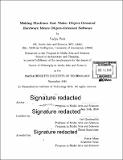| dc.contributor.advisor | Neil Gershenfeld. | en_US |
| dc.contributor.author | Peek, Nadya (Nadya Meile) | en_US |
| dc.contributor.other | Program in Media Arts and Sciences (Massachusetts Institute of Technology) | en_US |
| dc.date.accessioned | 2017-03-20T19:40:56Z | |
| dc.date.available | 2017-03-20T19:40:56Z | |
| dc.date.copyright | 2016 | en_US |
| dc.date.issued | 2016 | en_US |
| dc.identifier.uri | http://hdl.handle.net/1721.1/107578 | |
| dc.description | Thesis: Ph. D., Massachusetts Institute of Technology, School of Architecture and Planning, Program in Media Arts and Sciences, 2016. | en_US |
| dc.description | Cataloged from PDF version of thesis. | en_US |
| dc.description | Includes bibliographical references (pages 143-150). | en_US |
| dc.description.abstract | Rapid prototyping has been in the limelight for the past decade. 3D printers have an evocative name that promises production of complex parts on demand. Yet current practice doesn't quite deliver on these promises of advanced manufacturing. Existing digital fabrication tools enable repeatability and precision by using codes to describe machine actions. But the infrastructure used for digital fabrication machines is difficult to extend, modify, and customize. It is very difficult for the end-user to incorporate more forms of control into the workflow. Machine design today is largely the same as it was 50 years ago, despite decades of progress in other fields such as computer science and network engineering. I argue that we need to transition from rapid prototyping to rapid prototyping of rapid prototyping. To make diverse goods, we need diverse tools. To develop diversity in digital fabrication tools, we need reconfigurable and extensible infrastructure for machine building. Using insights from object-oriented programming, end-to-end principles in network design, and the open system interconnection model, I propose a new paradigm for machine building called object-oriented hardware. In this paradigm, software objects and hardware objects are peers that have procedures, methods, ports, and presentations. Machine building modules are available as software libraries are to programmers. A machine instantiation is an assembly of objects situated in a particular context. Using this approach, a thing together with the machine that makes it becomes an application. This method transcends the additive versus subtractive manufacturing comparisons by considering both types of rapid automation. Development work is divided into infrastructural engineering, which develop modules for use in any machine, and application development, which develop specific machine instantiations. Here I present technical implementations of machine building infrastructure first. These include distributed networked controls, reconfigurable software interfaces, and modular mechanical machine components. Then I present machine instantiations that use this infrastructure to demonstrate its capability. Finally to evaluate the object-oriented hardware paradigm in the wild, I observe machine building novices using these tools in both a workshop format and in the Fab Lab network for machine building. To make the modular components for machine building accessible in this context, I developed an extensible toolkit for machine building-the Cardboard Machine Kit. Using this toolkit, novices were able to make a wide range of machines, demonstrating the power of this method. | en_US |
| dc.description.statementofresponsibility | by Nadya Peek. | en_US |
| dc.format.extent | 150 pages | en_US |
| dc.language.iso | eng | en_US |
| dc.publisher | Massachusetts Institute of Technology | en_US |
| dc.rights | MIT theses are protected by copyright. They may be viewed, downloaded, or printed from this source but further reproduction or distribution in any format is prohibited without written permission. | en_US |
| dc.rights.uri | http://dspace.mit.edu/handle/1721.1/7582 | en_US |
| dc.subject | Program in Media Arts and Sciences () | en_US |
| dc.title | Making machines that make : object-oriented hardware meets object-oriented software | en_US |
| dc.title.alternative | Object-oriented hardware meets object-oriented software | en_US |
| dc.type | Thesis | en_US |
| dc.description.degree | Ph. D. | en_US |
| dc.contributor.department | Program in Media Arts and Sciences (Massachusetts Institute of Technology) | en_US |
| dc.identifier.oclc | 974648092 | en_US |
